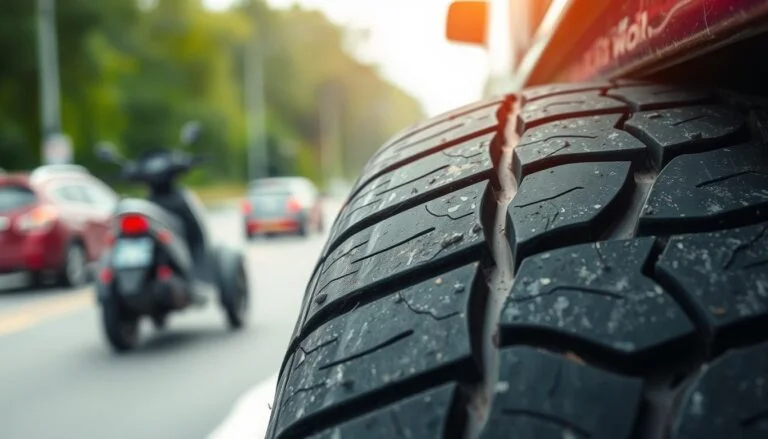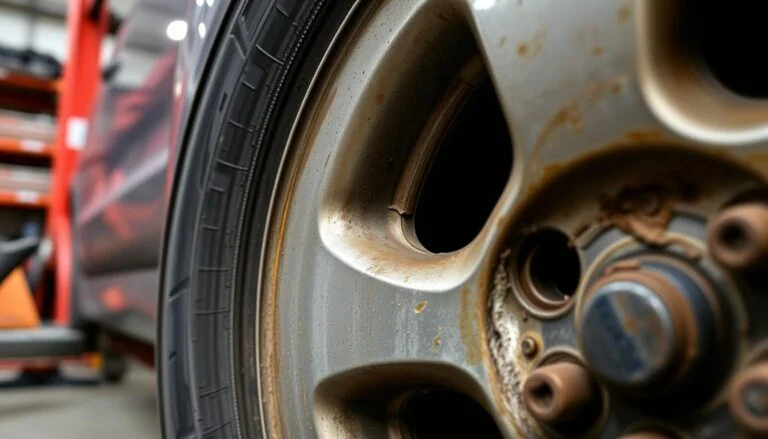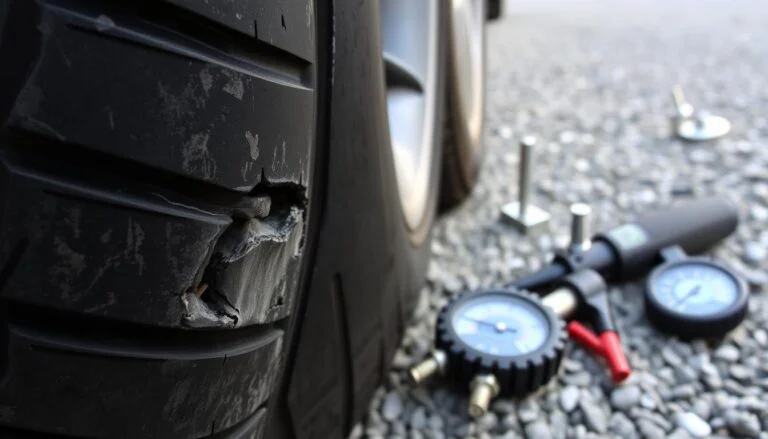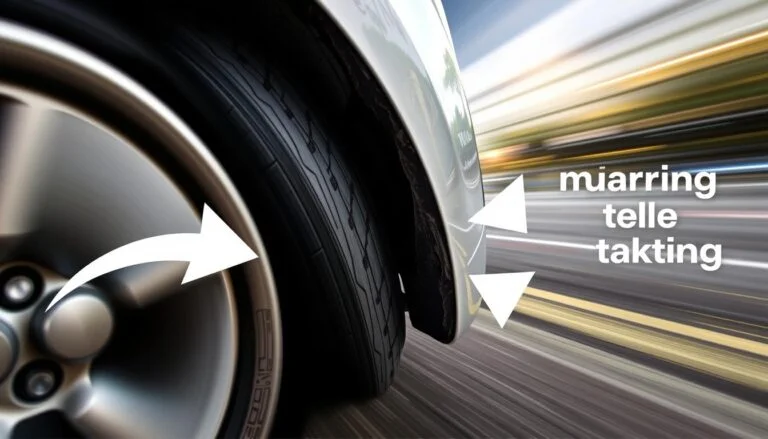What is Rust and How to Prevent It on Wheels?
Rust, also known as iron oxide, is a big problem in car care. It mainly affects metal parts like wheels. When iron or iron alloys react with moisture and oxygen, rust forms.
This rust not only makes your car look bad but also makes it unsafe. It also lowers your car’s value. Knowing how rust starts and how to stop it is key to keeping your wheels looking good and safe.

Key Takeaways
- Rust is the result of a chemical reaction between iron, oxygen, and moisture.
- Corrosion on wheels can weaken their structure and diminish their look.
- Preventing rust is essential for maintaining your vehicle’s safety and value.
- Regular inspection and maintenance practices can help in rust removal and prevention.
- Understanding rust formation helps in choosing effective anti-corrosion methods.
Introduction to Rust on Wheels
Wheel corrosion is a big problem for many cars, making them look bad and run poorly. It’s important to know how rust starts and what causes it. Rust happens when metal meets moisture and oxygen, starting a reaction that weakens the material.
Keeping your car’s wheels in good shape is key. The rusting process can speed up in certain conditions. Things like humidity, salt on roads, and the type of wheel material can affect how fast corrosion happens. Regular checks can catch rust early and stop it from getting worse.
Also, different wheel materials rust at different rates. Steel wheels rust more than alloy wheels. So, picking the right wheels and taking care of them is crucial. Spotting rust early, like discoloration or pitting, helps you act fast to keep your wheels going longer.
Good car care means checking and cleaning your wheels often. This can slow down rust. Knowing these basics helps keep your car running well and lasting longer.
Causes of Rust on Wheels
Knowing why wheels rust is key to keeping them in good shape. Things like the weather, what the wheels are made of, and how well they’re cared for all play a part. Let’s look at each factor to understand how they lead to rust.
Environmental Factors
Weather conditions are a big reason for wheel rust. Road salts used in winter can make rust worse. These salts eat away at the metal, causing metal oxidation. Also, high humidity in the air helps rust form fast. Rain or snow can make this problem even worse.
Material Composition
The material of the wheels also matters. Some metals react more to the environment. For example, steel wheels rust more than alloy wheels. But, even alloys can rust if their protective layer is damaged. Knowing this helps pick wheels that resist rust better.
Neglect and Poor Maintenance
How well you take care of your wheels is also important. Preventive measures like cleaning and checking them often are essential. If you ignore your wheels, dirt, salt, and moisture can build up. This makes rust more likely to start and spread. Taking good care of your vehicle helps prevent rust and keeps your wheels lasting longer.
| Cause | Impact | Preventive Measures |
|---|---|---|
| Road Salts | Accelerates corrosion | Regular washing to remove salt deposits |
| Humidity Impact | Promotes rust formation | Keep wheels dry and use protective coatings |
| Material Composition | Varies susceptibility to rust | Choose rust-resistant materials |
| Poor Maintenance | Increases risk of rust | Regular cleaning and inspection |
Types of Wheels Susceptible to Rust
Wheels are key parts of any vehicle. Their risk of rust depends on their material. We’ll look at steel wheels and alloy wheels. It’s important to know how to keep each type from rusting.
Steel Wheels
Steel wheels are strong and last long. But, they rust easily. Keeping them in good shape is a must.
Moisture and road salts can make rust worse. This can hurt the wheel’s strength. So, it’s key to check and clean them often.
Alloy Wheels
Alloy wheels are made from metals like aluminum and magnesium. They resist corrosion better than steel. But, they still need care to avoid rust.
Alloy wheels might not rust as much as steel. But, if they’re not cleaned right, they can still rust. It’s important to clean them often and use special coatings.
Rust Prevention Techniques
To keep wheels from rusting, use a mix of rust inhibitors and regular care. One easy way is to apply corrosion-resistant coatings on the wheels. These coatings act as a shield, stopping moisture and harmful substances from touching the wheel.
Using rust inhibitors is also a smart move. These chemicals stop rust by blocking the chemical reaction that causes it. Remember to put them on again often to keep your wheels safe.
Washing your wheels often is key, especially after driving on salty roads or near the sea. This removes harmful stuff that can cause rust. It’s a big help in keeping your wheels looking good.
Many car owners choose a multi-step protection plan. This might include:
- Cleaning wheels with water and a gentle soap
- Putting on a layer of rust inhibitors
- Finishing with a coat of corrosion-resistant coatings
This approach offers the best protection and makes your wheels last longer. It keeps your car looking great and running well.
Anti-Corrosion Methods for Wheels
Effective anti-corrosion methods are key to keeping your wheels in top shape. Using a mix of techniques like corrosion protection, moisture control, and anti-rust treatments helps prevent rust and wear. This ensures your wheels last longer and perform better.
It’s important to keep your wheels dry to stop rust. Wipe them down often and park your vehicle in a dry spot. Using products like WD-40 also helps control moisture and protect against rust.
Choosing the right anti-rust treatments is crucial, depending on your wheel type. Steel wheels need a zinc-rich primer and a strong topcoat for protection. Alloy wheels, however, require special coatings to last longer.
Both chemical and physical methods are important. Chemical treatments like rust converters and inhibitors change rust’s chemical makeup, making it harmless. Physical barriers, such as coatings and covers, block corrosive agents from reaching your wheels.
Using these methods not only extends your wheels’ life but also keeps them looking good. By combining corrosion protection, moisture control, and anti-rust treatments, you can prevent rust and enjoy a smoother ride.
- Regularly clean and dry wheels.
- Apply moisture displacement products.
- Select appropriate anti-rust treatments based on wheel material.
- Implement chemical and physical protection strategies.
Wheel Maintenance Tips
Keeping your vehicle’s wheels in good shape is key to their longevity and safety. A regular routine of detailing and rustproofing can save you money and prevent dangers. Here are some essential tips for maintaining your wheels.
Regular Cleaning
Cleaning your wheels regularly is crucial. Washing them often removes dirt, brake dust, and road salts that can cause rust. Use the right cleaning products for your wheels to keep them looking great and lasting longer. After cleaning, apply a protective wax to add extra protection against rust.
Inspection for Damage
Make sure to regularly inspect your wheels for any damage. Look for dents, scratches, or signs of rust. Catching these issues early through a visual inspection helps prevent more serious problems. Pay special attention to the wheel bolts and rims, where rust often starts.
Protective Coatings
Using protective coatings or wax on your wheels can greatly extend their life. High-quality protective wax creates a barrier against moisture and dirt. Ceramic coatings offer long-lasting protection and are a great choice for rustproofing. Always follow the product’s instructions for the best results.
| Task | Frequency | Benefits |
|---|---|---|
| Regular Cleaning | Weekly/Bi-weekly | Removes contaminants and prevents corrosion |
| Visual Inspection | Monthly | Early damage detection and rust prevention |
| Protective Coatings | Quarterly | Long-term protection from rust and wear |
What is Rust and How to Prevent It on Wheels?
Rust on wheels is a big deal for car care and safety. It happens when metal corrodes, weakening your car’s wheels. Things like weather and not taking care of your car can make rust worse. Keeping up with wheel maintenance helps a lot.
Rust forms when metal meets oxygen and moisture. This makes iron rust, which can harm your wheels. Staying on top of corrosion control can stop big problems.
To stop rust, clean your wheels often and check for damage. Also, use protective coatings. These steps help your wheels last longer and make driving safer. Here’s how different materials handle rust:
| Material | Susceptibility to Rust | Best Rust Prevention Method |
|---|---|---|
| Steel | High | Regular Cleaning & Anti-Corrosion Coating |
| Alloy | Moderate | Inspection & Clear Coating |
Regular corrosion control saves money and keeps your car looking good. With good wheel maintenance, you can avoid rust problems. This keeps your wheels in top shape.
Importance of Early Intervention
The importance of early rust treatment is huge for keeping vehicle wheels in good shape. Treating rust early stops it from getting worse. This means you avoid expensive fixes or having to replace parts.
Starting proactive maintenance means checking your wheels often for rust or damage. This early action saves money in the long run. It also keeps your wheels looking good and your car’s value up.
It’s also key to know the cost of ignoring rust. Spending a bit of time and effort on early treatment saves a lot of money later. This is a smart move that pays off.
For car owners, it’s crucial to catch rust early and keep up with maintenance. Always look for signs of rust and act fast. This way, you save money and keep your car’s value high.
Products to Prevent Wheel Rust
To keep your wheels safe from rust, you need special products. These products fight corrosion and make your wheels last longer. Here’s a look at the best sprays, agents, and products for wheel care.

Rust prevention sprays are easy to use and work well. They create a shield against moisture and salt. For example, WD-40 Specialist Long-Term Corrosion Inhibitor is known for lasting protection.
Anti-corrosion agents come in gel and liquid forms. POR-15 Rust Preventive Coating sticks well to wheels and stops rust. They’re great for steel wheels that rust easily.
Adding wheel care products to your routine helps too. Meguiar’s Hot Rims All Wheel Cleaner and Armor All Wheel Protectant clean and protect your wheels. They also fight off corrosion.
| Product | Type | Benefits |
|---|---|---|
| WD-40 Specialist Long-Term Corrosion Inhibitor | Spray | Easy application, long-lasting protection |
| POR-15 Rust Preventive Coating | Anti-corrosion Agent | Strong adhesion, excellent for steel wheels |
| Meguiar’s Hot Rims All Wheel Cleaner | Wheel Care Product | Cleans and protects, resistant to corrosion |
| Armor All Wheel Protectant | Wheel Care Product | Protective coating, ease of use |
Choosing the right product depends on your wheel type and how you use them. Using rust prevention sprays or agents regularly can make your wheels last longer. Adding wheel care products to your routine keeps your wheels protected all the time.
Professional Wheel Refinishing Services
Professional wheel refinishing services do more than just make your wheels look good. They also make them last longer and work better. This is a smart choice that saves you money in the long run.
Benefits of Professional Services
Choosing professional wheel refinishing means getting top-notch results. Experts use the best techniques and materials for a lasting finish. They pay attention to every detail, making your wheels look amazing and last longer.
“Professional wheel refinishing services deliver a level of expertise and precision that is hard to replicate with DIY methods. The dedication to quality is evident in every aspect of the process.” – Automotive Industry Expert
Cost Considerations
Thinking about the cost of professional wheel refinishing? It’s worth it. The initial cost is high, but you save money in the long run. Plus, your wheels will look and last better, making it a smart investment.
| Service Type | Initial Cost | Long-term Savings |
|---|---|---|
| DIY Wheel Refinishing | Low | Moderate |
| Professional Wheel Refinishing | Moderate | High |
Choosing professional wheel refinishing is a wise choice. It looks great right away and saves you money over time. It’s a smart way to keep your wheels in top shape.
DIY Rust Removal and Prevention
If you love working on your car, learning to remove rust is key. This guide will show you how to get rid of rust and keep it from coming back.
Step-by-Step Guide
- Preparation
- Cleaning
- Removing Rust
- Sanding
- Priming and Painting
- Sealing
Materials Needed
To do this job at home, you’ll need the following essential tools:
- Rust remover solution
- Wire brush
- Sandpaper (various grits)
- Primer
- Rust-resistant paint
- Clear coat
- Soap and water
- Safety gear (gloves, goggles)
| Essential Tool | Function |
|---|---|
| Rust remover solution | Loosens and removes rust |
| Wire brush | Scrubbing away loosened rust |
| Sandpaper | Smoothing the metal surface |
| Primer | Prepares the surface for painting |
| Rust-resistant paint | Prevents future rusting |
| Clear coat | Seals and protects the paint |
Common Mistakes in Rust Prevention
Keeping wheels rust-free is key. Yet, many people make wheel care errors that harm their efforts. This section will show you common mistakes and how to avoid them.

One big maintenance misstep is not cleaning wheels often. Dirt and grime trap moisture, speeding up rust. Always wash your wheels well to remove dirt that can cause corrosion.
Using the wrong cleaning tools is another mistake. Harsh chemicals and abrasive brushes can damage the protective layer. Use soft cloths and mild detergents made for wheel care to keep the finish safe.
Not applying protective coatings is a big error. Many think their wheels are already protected, but the coating wears off. Apply sealant or wax regularly to keep your wheels safe from rust.
Storing wheels in damp or poorly ventilated areas also causes rust. Keep your wheels in a dry, controlled environment to prevent rust.
Ignoring early rust signs is a critical maintenance misstep. Catching rust early can stop it from getting worse. Regularly check for rust and fix it right away.
To sum up, avoiding these wheel care errors and prevention pitfalls can make your wheels last longer. Make these practices part of your routine to keep your wheels looking great.
| Common Mistake | Recommended Practice |
|---|---|
| Neglecting regular cleaning | Wash wheels frequently |
| Using abrasive brushes | Use soft cloths |
| Overlooking protective coatings | Apply sealant or wax regularly |
| Improper storage conditions | Store in dry, ventilated spaces |
| Ignoring early rust signs | Inspect and address rust promptly |
Conclusion
The fight against rust on wheels needs a proactive approach. This ensures your wheels last longer and keeps your vehicle’s value up. Knowing what rust is and what causes it is key.
Preventive steps like regular maintenance and protective coatings are crucial. They help keep corrosion at bay.
We’ve looked at different ways to fight rust, from professional services to DIY methods. Keeping up with maintenance is vital. It not only makes your wheels look good but also makes them last longer.
Regular cleaning and checks are important parts of car care. They help prevent rust and protect your vehicle’s value.
Using these rust prevention methods shows you care about your vehicle. It ensures your wheels last and keeps your car’s value high. This makes your car a great investment in both durability and looks.
FAQ
What is rust and how does it form on wheels?
Rust, or iron oxide, forms when iron meets moisture and oxygen. Wheels made of iron or steel can rust easily. This happens when they’re exposed to water, road salts, and other environmental factors. Rust can weaken and damage the look of your wheels.
How can I prevent rust on my wheels?
To stop rust, wash your wheels often, especially after driving on salty or wet roads. Use rust inhibitors and protective coatings to shield them. Regular checks and cleanings help catch and manage rust early.
Are some types of wheels more prone to rust than others?
Yes, steel wheels rust more than alloy wheels because of their iron content. Alloy wheels, made from metals like aluminum and magnesium, resist corrosion better. But, they still need care to avoid rust and damage.
What environmental factors contribute to wheel rust?
Environmental factors like road salts, high humidity, and water contact cause wheel rust. These conditions speed up rust formation.
Can neglect and poor maintenance lead to rust on wheels?
Yes, ignoring cleaning, not using protective treatments, and not checking for rust can cause serious damage. Keeping up with maintenance is key to preventing rust.
What are some effective rust prevention techniques?
Effective methods include using rust inhibitors and sprays, washing wheels often, and keeping them dry. Protective coatings and regular checks are also important.
Are there specific products to help prevent wheel rust?
Yes, many products like sprays, gels, and waxes can protect against rust. Choosing the right one for your wheels and maintenance routine is crucial.
Should I consider professional wheel refinishing services?
Professional services offer top-notch results and advanced techniques. While it costs more upfront, it can extend your wheels’ life and keep them looking great.
Are there DIY methods for rust removal and prevention?
Yes, you can remove and prevent rust at home. Clean your wheels, use rust removers, and apply protective coatings. Following a step-by-step guide and using the right materials is key.
What are common mistakes in rust prevention?
Common errors include not cleaning regularly, using the wrong cleaners, and ignoring early rust signs. Not reapplying protective coatings can also expose your wheels to moisture and corrosion again.





